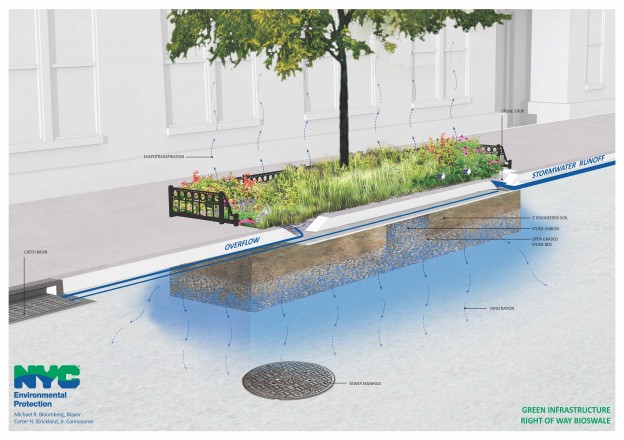The confines of Community Board 5 are about to get greener.
Representatives from the Department of Environmental Protection (DEP) announced during the Community Board 5 (CB 5) meeting on Wednesday that the construction of 200 to 250 bioswales is set to begin at the end of the month.
Bioswales are curbside gardens that collect stormwater runoff into large, underground basins through 5 feet of specially engineered soil, comprised of layers of broken stone and sandy soil.
“New York’s infrastructure is hard, it’s very dense,” said Ibrahim Abdul-Matin, director of community affairs for the DEP. “Green infrastructure is, in a sense, peeling back a layer of that hard infrastructure.”
“Part of what we’re doing is making the land spongy again,” he continued. “The goal is to improve water quality…this is one of our tools to do that.”
The bioswales help improve the city’s water quality by reducing the amount of rainwater entering the sewer system, which helps lower combined sewer overflow (CSO).
CSO is a combination of sewage water from homes and businesses and stormwater, which can become too much for the sewer system to handle, especially during times of heavy rainfall. The water then overflows and sends untreated water into the city’s waterways, such as Newtown Creek, which suffers from high levels of pollution.
One single bioswale can manage almost 3,000 gallons of water and if the bioswale becomes overfilled, the water is released into the sewer catch basin as it normally would, just at a lower rate so there is not a rush of water that could overflow the sewer system.
With the installation of the bioswales right around the corner, community issues are a major point of concern for the DEP.
“One of the big questions we get a lot is, ‘Who is going to take care of these?’” Abdul-Matin told the board. “We build it, we’re going to maintain it. It’s not like we’re going to pass the buck onto you.”
The construction and installation of these bioswales and other green infrastructure will help clean the city’s water and reduce flooding, making the neighborhoods they serve better.
RECOMMENDED STORIES
































